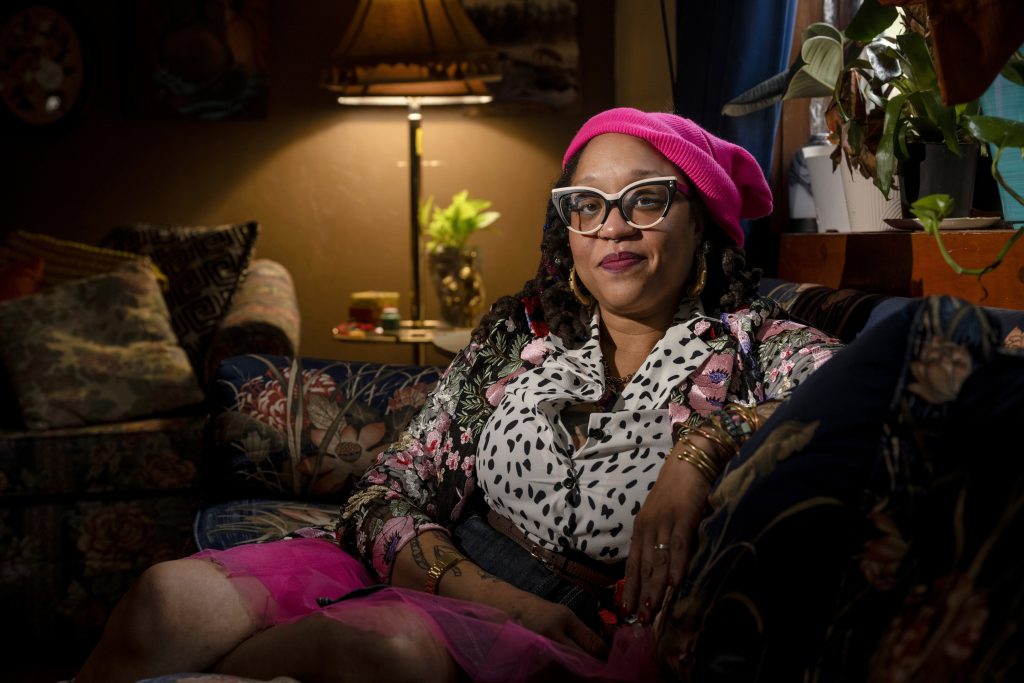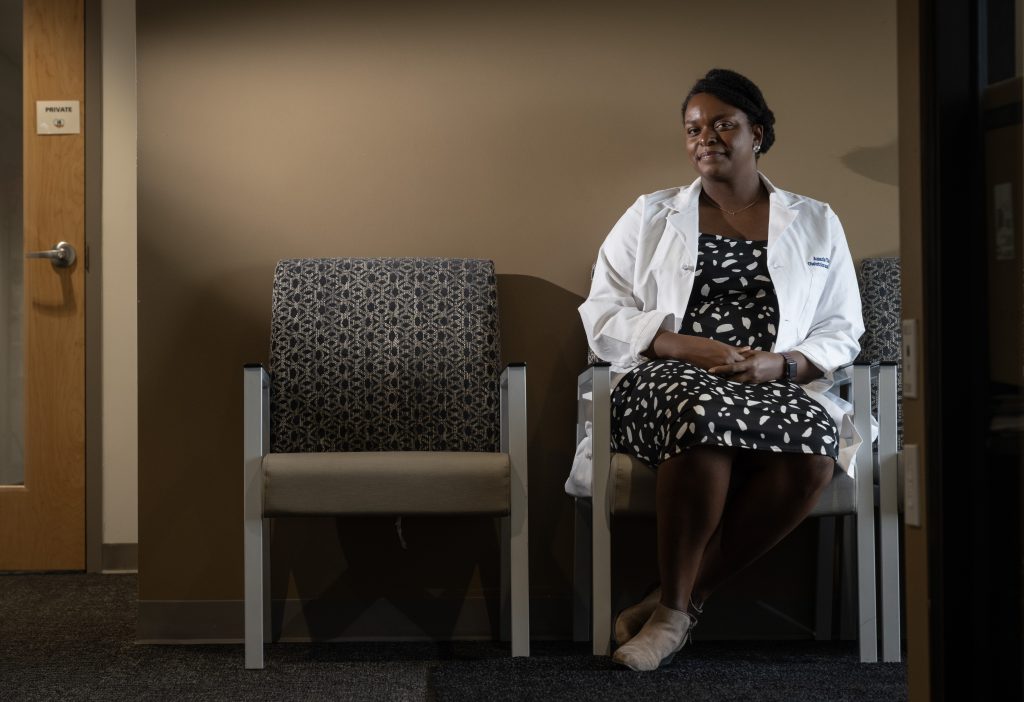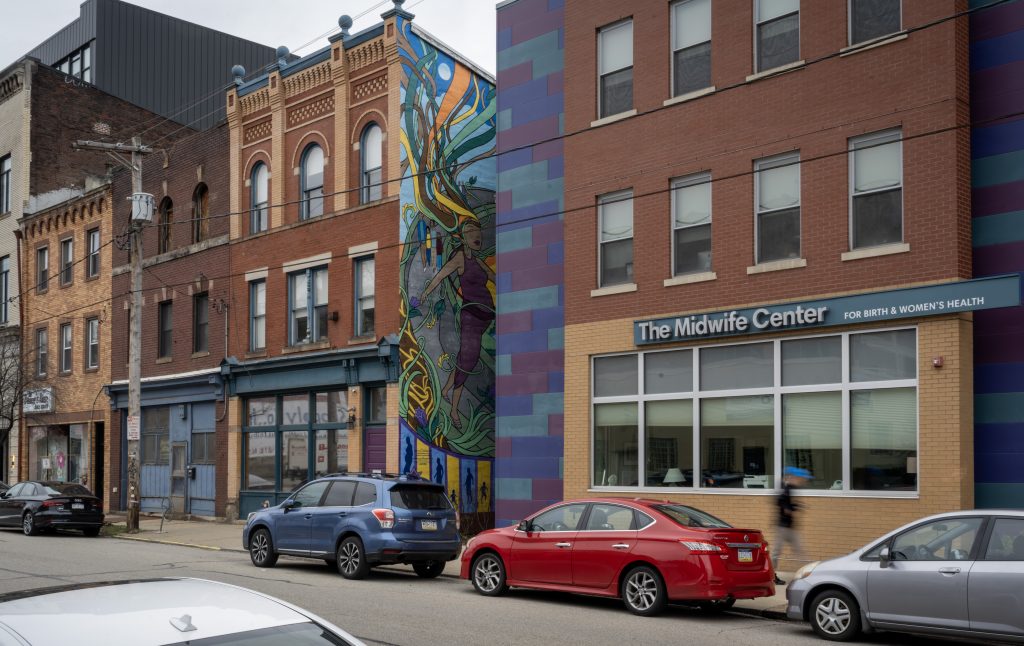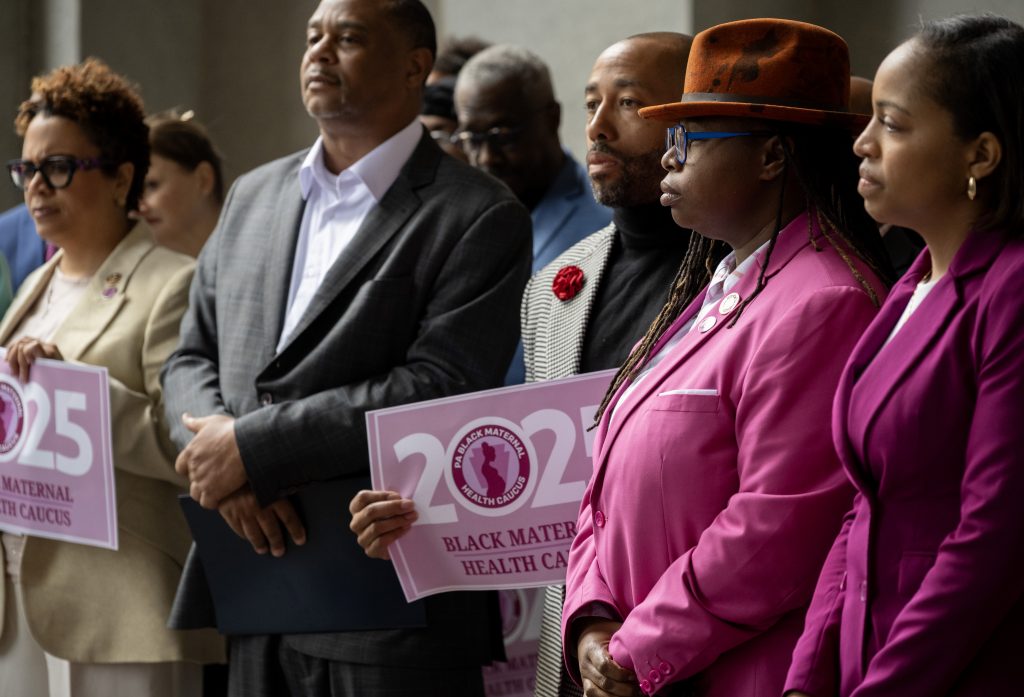Black maternal deaths are among the highest in the US and, according to experts, most are preventable. How Pittsburgh is trying to change course.
By Atiya Irvin-Mitchell
Amber Edmunds says that having her first child was a horrific experience. She was scheduled to have her labor induced, which turned into an emergency C-section for the then 22-year-old. Edmunds was terrified during the whole ordeal and terribly disappointed. Looking back, she says there was a distinct lack of communication from medical personnel responsible for guiding her through the experience. Weeks earlier, she’d attended a friend’s birth and watched the staff walk her and her family through the birthing process from start to finish—patiently explaining each step. The difference between Edmunds and her friend is that her friend is white, and she is Black.
Edmunds, who at the time worked as an esthetician, says that she’d had negative encounters with healthcare professionals in the past, and she dislikes surprises. But despite her best efforts to research and prepare a birth plan, Edmunds’ wishes were ignored by her doctors, who seemed uninterested in hearing what she had to say. She emphasizes that doctors were rough during exams and applied stereotypes about Black women and girls to her. A decade would pass before Edmunds would go on to give birth to two more children. Again, her inquiries and concerns fell on deaf ears.
“It’s always been awful, and almost to the point of like there’s a lot of shame in it, which is terrible, especially when you’re young,” Edmunds says. “I tried to talk to the doctors about it. I didn’t feel like there was anywhere to turn [and] I didn’t feel like I had any support.”
Edmunds says she’d always had negative experiences when she sought out reproductive care, before and after she had children. Unfortunately, she isn’t alone.
As of 2022, the Pew Research Center estimates that 71% of Black American women between the ages of 19 and 49 report having negative experiences with healthcare providers.
When it comes to maternal deaths in the US, the Centers for Disease Control estimates that Black women are three times more likely to die from a pregnancy-related cause than white women. According to the National Institutes of Health, the leading causes of maternal deaths include cardiovascular disease, bleeding, infection, and hypertension.
We have a very expansive and intersectional view around how we address this issue. And as a caucus, we are doing something every day, every week, in Harrisburg and in our districts to address Black maternal health.
State Representative La’Tasha Mayes
As for the city of Pittsburgh, research shows that by moving away, Black residents see their employment, education, and health prospects improve. When it comes to childbirth, the Steel City is a perilous place for Black women and babies alike. While America has one of the highest rates of maternal mortality for a high-income nation, according to the CDC, Black women experience 2.6 times the rate of deaths in comparison to their white counterparts (50.3 deaths per 100,000 live births vs 14.5 deaths per 100,000 live births in 2023).
Using data from the National Vital Statistics System, the CDC found that a total of 669 women in the US died of pregnancy related causes in 2023. The report notes that the numbers fluctuate annually, even as the same racial disparities persist. Of these women in 2023, for example, 247 were Black, 259 were white, 117 were Latino, and 23 were Asian. Despite often being praised for its medical institutions and discoveries, Pittsburgh has some of the country’s highest maternal deaths with Black women dying at distinctly higher rates. The Allegheny County Health Department reports that the maternal death rate for Black women is two and a half times higher than their white counterparts.
BlackPittsburgh.com spoke to researchers, doctors, doulas, and midwives to better understand why Black women die far too often during pregnancy, or up to 6 weeks after giving birth. Nearly six years after a 2019 Gender Equity Commission Report from the University of Pittsburgh School of Social Work revealed inequalitiesBlack women and girls in Pittsburgh face in health, income, employment and education, the experts say that mistrust of medical professionals, systemic racism, and lack of support for new parents are at the root of the maternal mortality disparities.
Amber’s Story
During Amber Edmunds’ second C-section, when she was in her early 30s, she noticed she wasn’t healing properly. When she went to her doctor about severe pain, doctors didn’t believe her, and she was told to return at her six-week check-up.
“I had so much scar tissue, there were like adhesions, and I was swollen, and it didn’t heal up,” Edmunds recalls. “It was seeping and disgusting, and I knew something was wrong. So, I called the doctor’s office, and I was like, ‘It’s really hard for me to wear pants. I feel really gross.’ I was upset. I was really having a hard time. They kept saying to me, ‘Oh, well, you know, you’re fine. Everything is fine. You can’t be in that much pain.’”
When she could no longer take the pain, Edmunds went to the hospital and was finally prescribed antibiotics. She then got better, but the bad experience stayed with her.
“No one believed me,” Edmunds says.

In the aftermath, Edmunds struggled with the lack of support until a friend encouraged her to join The Midwife Center’s breastfeeding support group. With the group, she felt encouraged by meeting other Black women whose job was supporting new mothers through their postpartum journeys. Over time, Edmunds went from recommending The Midwife Center’s services to her clients to becoming a certified doula whose job is to provide support to a person before, during, and after, giving birth. In this capacity, Edmunds feels she’s there to protect the family and ensure they’re supported even after the baby arrives. As a doula and director of civic engagement at MAYA (Me and You Always), a non-profit that centers BIPOC and marginalized birthing people and birth workers, Edmunds feels she’s there to protect the family and ensure they’re supported even after the baby arrives.
Oftentimes, Edmunds says, her clients share things with her that they’re too afraid to tell their doctors—like they’re terrified of dying while giving birth or they’re fearful of developing postpartum depression. Edmunds says that doulas consider mental health in ways that healthcare professionals may overlook. And despite studies showing that doulas can improve birth outcomes, particularly for Black patients, doctors and doulas are often at odds, in Edmunds’ experience.
“I believe that we should have really great relationships and I am really grateful for the times when I have been able to build trusting relationships with some healthcare professionals,” Edmunds says. “But I often think that because there is a hierarchy of academia and education, they look at us like, ‘Oh, you don’t know anything.’”
Edmunds’ experiences aren’t unique. Black patients are statistically less likely to receive medication for pain treatment and as recently as 2016, half of all medical students believe that Black people had a higher threshold for pain than their white counterparts.
I’ve had doulas tell me things about patients that are really important that I didn’t know as the provider because it’s just not something that they felt comfortable bringing up in their 15-minute appointment.
Dr. Amaris Yandel, East Liberty Family Health Care Center OB/GYN
As was the case with doctors dismissing her infection after giving birth, Edmunds says many of her Black women clients have had experiences where medical professionals didn’t believe that they were in pain. According to Edmunds, too many doctors are willing to believe their patient is either exaggerating or seeking drugs; these assumptions do nothing to earn the patient’s trust. Until this changes, Edwards worries that her birthing client’s experiences will continue to be riddled with distrust and fear.
“Giving birth should be one of the most beautiful things, but death is at the forefront of their mind,” Edmunds says.
Doulas and Medicine
East Liberty Family Health Care Center obstetrician and gynecologist Dr. Amaris Yandel knows first-hand how important doulas can be to both patients and providers. Having worked as a doula herself during her AmeriCorps term of service at The Birth Circle (an organization that connects parents with birth professionals), Yandel says that doulas matter because they can often meet patients where they’re at, both physically and emotionally. With this bond, they can gain a sort of trust that physicians can lack with patients. As a doctor, Yandel acknowledges that she sometimes has very little time to spend with patients, therefore doulas can share helpful information.
“I’ve had doulas tell me things about patients that are really important that I didn’t know as the provider because it’s just not something that they felt comfortable bringing up in their 15-minute appointment,” Yandel says. “For me, that’s really helpful, because it can also help me figure out if I need to be doing something different as the doctor.”

Yandel adds that doulas are in a unique position to advocate for patients, particularly in a healthcare system where Black women can struggle to be heard. Additionally, doulas can sometimes be in a better position to communicate than the patient, who can be overwhelmed by the pain and stress of labor itself.
“You’re in a ton of pain, you’re just trying to focus on yourself and getting the baby out, and then you have doctors coming in, and we’re saying a whole bunch of stuff, and it’s kind of tough sometimes to take all of that in,” Yandel says. “I think that the doula is a lovely bridge between the medical provider and the patient.”
When looking at why Black women in Pittsburgh often have disproportionate negative outcomes when it comes to childbirth, Yandel agrees that part of the problem is that medical providers often aren’t listening to Black mothers.
“They’re not necessarily having problems because they were less healthy or because they didn’t have access to care,” Yandel says. “We talk about those things a lot, but we’re seeing like, ‘Oh, this person said that they didn’t feel well, and it wasn’t really taken seriously.’”
According to research, having health insurance or even a higher income isn’t enough to shield Black women and babies from death or from having their pain ignored. Additionally, a National Bureau of Economic Research study examined one million births from 2008-2017 and found that Black women are 25 percent more likely than white women to have unnecessary C-sections. When Yandel thinks about how to create better outcomes for both mothers and babies, she says the changes need to be structural, addressing present biases in the healthcare system.
“I do know that they are putting a lot more implicit bias training in schools, and I think those are really wonderful ways to kind of start addressing this, especially [for] our learners who are going to be, our future doctors, right?” she says. “But I definitely would love to have more conversations about, ‘Well, why are we not listening to people when they’re having pain?’ What is it that’s in us, you know?”
The Midwife Center
Aya Eliza-Christie, a former clinic nurse and a current midwife at The Midwife Center in the Strip District, notes that although high maternal mortality rates aren’t unique to Pittsburgh, she still wishes addressing the issue was more of a priority for the Pittsburgh healthcare community. After years of ample evidence, she believes the time has come for the industry to stop asking Black doctors and patients to prove their experiences are valid and work on solving the problem.
“We need to be listening to Black women,” Eliza-Christie says. “There needs to be a succession plan, there needs to be pathways to deferring to and elevating the leadership of Black women who are having these experiences, because often, anything that we’re doing to improve the experiences of Black women and families are going to improve the experiences for everybody.”

At the Center, which emphasizes personalized client-centered care, Eliza-Christie works with Black families to ensure that their pregnancies have a positive outcome. But that still doesn’t account for systemic failures.
“We need to be doing a lot more to be checking in [on] people. And so much of the morbidity and mortality issues come up postpartum and aren’t necessarily even accounted for,” Eliza-Christie says.
What listening looks like for The Midwife Center is a perinatal support program where Eliza-Christie follows up with patients up to a year after the initial postpartum period. She says physiologically, emotionally, and socially stressors can persist far beyond six weeks. And if a client expresses that they’re experiencing a lot of stress, Eliza-Christie (the coordinator of the program) and community health workers are available to check in more frequently with them in between appointments or longer visits.
I was upset. I was really having a hard time. They kept saying to me, ‘Oh, well, you know, you’re fine. Everything is fine. You can’t be in that much pain.
Amber Edmunds, mother of three
Research shows that Black babies under the care of Black physicians experience lower incidences of infant death in comparison to those cared for by white doctors. And many Black patients say they feel safer in the care of Black OB/GYNs. Still, as of 2020 and 2021 respectively, roughly 10% of active obstetrician-gynecologists in the United States identified as Black or African-American and 7% of certified nurse midwives were Black. In addition to providing referrals for services like doulas and making sure existing providers are making meaningful connections with patients, Eliza-Christie believes that the state and country could benefit from having more Black providers so that families can feel they’re being cared for by someone who can share their experiences.
“The state of Pennsylvania needs more Black midwives, the United States needs more Black midwives, there needs to be a lot of reparation for what was done to Black midwives [who] helped, that took care of entire communities generations ago,” Eliza-Christie says. She believes this begins by acknowledging that healthcare as an institution took that care away from communities and set them up for poor outcomes.
Momnibus and beyond
Before becoming an elected official, Pennsylvania State Representative La’Tasha Mayes (D-Allegheny) saw firsthand how many disparities exist for pregnant Black Pennsylvania residents in her capacity as founder and CEO of New Voices for Reproductive Justice. Once in office, and when it was finally politically feasible in Harrisburg, she and her co-chairs, Reps. Morgan Cephas (D-Philadelphia) and Gina Curry (D-Delaware), moved to create the Pennsylvania Black Maternal Health Caucus in October 2023, one of the few Black maternal health caucuses finally addressing a longtime concern.
“We made it clear that this was going to be a priority for our house, the Democratic caucus, and for Black maternal health advocates, birth workers, and providers all across the state,” Mayes said. “And it was game-changing.”

With the caucus’ founding, the Commonwealth joined the ranks of two other states, Ohio and Minnesota. Mayes says that a lot of factors contribute to Black maternal mortality and morbidity, and that the conversation needs to be less centered on blaming expectant mothers and more on investment in education and access.
“Do people have education, information, and knowledge about maternal health care? Do they know that they have alternatives, like birth centers or home births?” Mayes asks. “Do they know about doulas? Do they already have access to a provider, [or] a doctor that they trust and know that that doctor has their best interest at heart?”
Mayes adds that it’s important not to see high rates of maternal deaths as just numbers. While the 2019 Gender Equity Report raised awareness about important issues, the researchers failed to work with those directly impacted, Mayes says.
“We have two health systems here, and I’ve heard people come to me in my previous role, talking about the care they receive, and it’s almost always been negative,” she says. “People are relying on our hospital systems to deliver the best care for moms and pregnant folks and birthing people and we’re not seeing that. We’re not seeing the level of care and protection needed to ensure Black moms don’t die.”
To help ensure that Black families have what they need to thrive during and after the delivery process, in March 2024, the caucus proposed a series of legislation called the Momnibus bills. In October, Gov. Josh Shapiro signed two of the eight Momnibus bills into law. One of the new laws is a public awareness campaign about postpartum depression. The other new law allows Medicaid to reimburse certified doulas during and after pregnancy. If passed, the additional bills would provide new parents with newborn kits, require health insurance companies to cover blood pressure cuffs during and after pregnancy, and employ implicit bias training to health care professionals.

“We have a very expansive and intersectional view around how we address this issue,” insists Mayes, “and as a caucus, we are doing something every day, every week, in Harrisburg and in our districts to address Black maternal health.”
Last week, lawmakers, doulas, parents and midwives gathered for a Summit in downtown Pittsburgh to commemorate Black Maternal Health Week. Hosted by Mayes and the Pennsylvania Black Maternal Health Caucus, the gathering discussed safety, joy, and how to ensure better outcomes during and after birth for mothers and babies alike.
Much of the Momnibus package has yet to be passed, but Mayes vows that the caucus will keep trying to secure legislation to address Black maternal mortality because the consequences for babies and mothers alike are dire.
“Secretly and behind closed doors [people] talk about the losses of their family members who gave birth, and the mom or birthing person didn’t survive,” Mayes says. “Those whispers are not whispers anymore.”
Resources:
Atiya Irvin-Mitchell is a Pittsburgh-based freelance writer. She can be reached at airvinmitchell@gmail.com and you can follow her on Twitter @AtiyaWrites.


